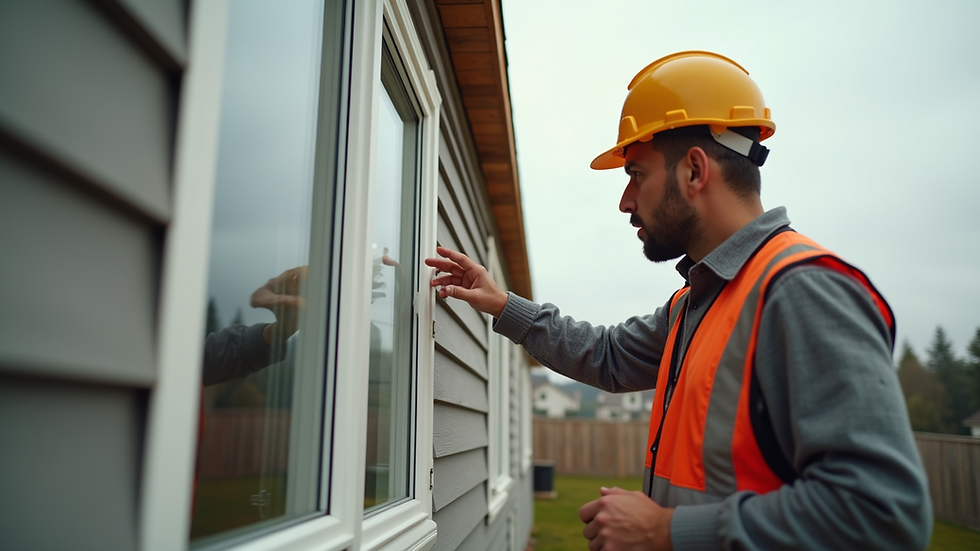Essential New Construction Inspection Insights
- steve49879
- Oct 7
- 4 min read
When you’re investing in a new property, whether it’s a cozy home or a commercial space, you want to be sure it’s built right. New construction can be exciting, but it also comes with its own set of challenges. That’s why understanding the importance of thorough building quality checks is crucial. These inspections help catch issues early, save money, and give you peace of mind. Let’s dive into what you need to know about new construction inspections and how they protect your investment.
Why Building Quality Checks Matter for New Construction
Building quality checks are more than just a formality. They are a vital step in ensuring that your new property meets safety standards and performs well over time. Even the best builders can miss something, and materials or workmanship can vary. By having a professional inspection, you get an expert’s eye on every detail.
Think about it this way: Would you buy a car without a test drive? A building quality check is your test drive for a new property. It helps identify potential problems like structural weaknesses, electrical issues, or plumbing leaks before they become costly repairs.
Here are some key reasons why these checks are essential:
Safety First: Ensuring the building is safe for occupants.
Financial Protection: Avoiding expensive fixes after closing.
Negotiation Power: Using inspection reports to request repairs or credits.
Long-Term Value: Maintaining the property’s worth with proper construction.

What to Expect During Building Quality Checks
When you schedule building quality checks, the inspector will follow a detailed process. They look at everything from the foundation to the roof, including electrical systems, HVAC, plumbing, and insulation. The goal is to verify that all components meet local building codes and manufacturer specifications.
Here’s a breakdown of what typically happens:
Foundation and Structure: Inspectors check for cracks, proper drainage, and framing integrity.
Roof and Exterior: They assess shingles, gutters, siding, and windows for quality and installation.
Electrical Systems: Ensuring wiring is safe, outlets work, and panels are correctly installed.
Plumbing: Checking pipes, fixtures, water pressure, and drainage.
HVAC: Verifying heating and cooling systems function efficiently.
Interior Finishes: Looking at drywall, flooring, cabinets, and paint for defects.
The inspector will provide a detailed report with photos and notes. This report becomes your roadmap for addressing any issues before finalizing the purchase.

What are the three main types of inspections?
Understanding the different types of inspections can help you know what to expect and when to schedule them. For new construction, the three main types are:
1. Pre-Drywall Inspection
This happens before the drywall is installed. It’s a critical stage because the inspector can see the framing, wiring, plumbing, and HVAC systems. Catching problems here is easier and less expensive to fix.
2. Final Inspection
Once the construction is complete, the final inspection ensures everything is finished correctly and safely. This includes checking all systems, finishes, and appliances.
3. Warranty Inspection
Many builders offer a warranty period after you move in. A warranty inspection, usually done near the end of this period, helps identify any issues that may have developed and need repair under warranty.
Each inspection serves a unique purpose and helps protect your investment at different stages of the building process.

How to Choose the Right Inspection Service
Choosing the right inspection service is just as important as the inspection itself. You want a company that understands local building codes and has experience with new construction. Look for inspectors who are certified, have good reviews, and communicate clearly.
Here are some tips to help you select the best inspection partner:
Check Credentials: Verify licenses and certifications.
Ask About Experience: Especially with new construction in your area.
Request Sample Reports: To see how thorough and clear they are.
Look for Comprehensive Services: Some companies offer additional services like energy audits or mold testing.
Communication Style: Choose someone who explains findings in plain language and answers your questions patiently.
By doing your homework, you’ll find a trusted expert who can guide you through the inspection process with confidence.
Taking Action After Your Inspection
Once you receive your inspection report, what’s next? Don’t let the paperwork overwhelm you. Instead, use it as a tool to make informed decisions.
Here’s a simple plan to follow:
Review the Report Carefully: Highlight any major concerns or safety issues.
Discuss with Your Builder: Share the findings and ask for repairs or clarifications.
Negotiate if Needed: Use the report to request price adjustments or fixes before closing.
Schedule Follow-Up Inspections: If repairs are made, verify they were done properly.
Keep Records: Save all reports and communications for future reference.
Remember, inspections are about protecting your investment and ensuring your new property is a safe, comfortable place to live or work.
If you want to learn more about professional new construction inspections, Texas Professional Inspections offers expert services tailored to Central Texas properties. Their thorough reports and clear communication set a new standard for quality and reliability.
By prioritizing building quality checks, you’re taking a smart step toward a worry-free property experience. Whether it’s your first home or a commercial project, these inspections give you the confidence to move forward with peace of mind.





Comments